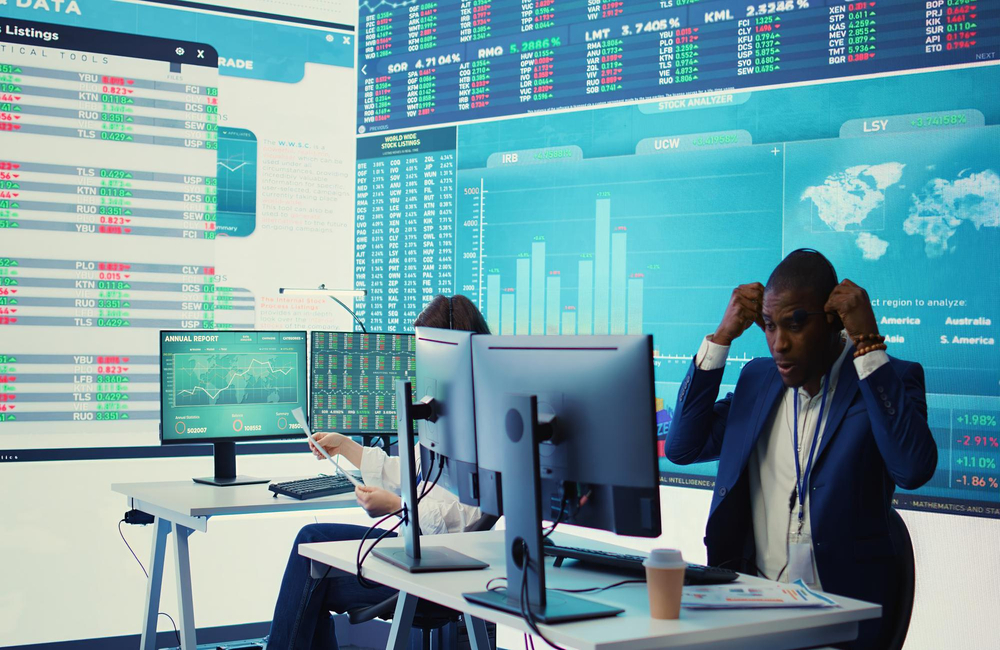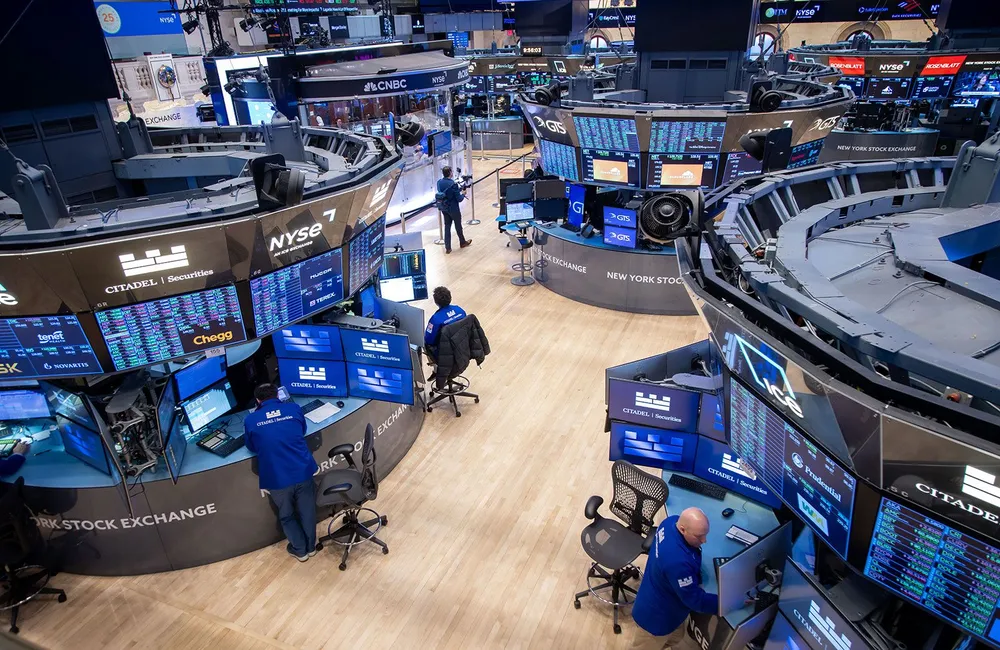And of course it happened as COVID took hold in March 2020, and the central banks of the world rode in on white horses.
Why are we Australians so obsessed about the US? Because its weighting in global equity markets is huge, approximately 56% of the values of these markets (in aggregate), compared to the next biggest, Japan at 7%, China at 5% and the UK at 4%. Australia barely creeps into the Top 10 at around 2% of world market cap. Australia's biggest foreign investor is the US, the biggest place Australians invest overseas.
The broad US equity market has outperformed Australia in recent years, directed largely by the success of some of its technology giants, but the negative price correlation with the US market is clear. For example, the chart below compares two index ETFs of the same provider, iShares, with blue showing the S&P/ASX200 (ASX:IOZ) and red the S&P 500 (ASX:IHVV), both over the last five years. If the US market is down in 2022, Australia would surely fall too, no matter the state of the domestic economy.
In the up-to-date market, it would be dangerous to assume the “Fed put” was going to save investors in 2022. Inflation in the US was recently reported at 7% annual, providing the Fed a greater problem than it faced in previous years. It is now committed to tightening, and already many economists think it is ‘behind the curve’ and moving too slowly.
This is one of several points made by Hamish Douglass in his final interview before his medical leave as Chairman and CIO of Magellan. The discussion centres on how he invests, not the context about his personal life and staff changes at Magellan, which have all been covered elsewhere. We also talked about wins and losses in his portfolio and how he responds to falls in the market.
Now there will be winners and losers along the way, but the best thing to do isn’t to bet your house but to let the slow compounding of wealth in quality companies do its job. In the fall out of the most recent tech melee, Warren Buffett went from being criticized for his old world values, to being defined, alongside rightwing fanatics, as more like Ark Angel, as he rode the Eagles 2020 and 2021 victories into the world’s most successful tech flagship, ARK Innovation Fund.
Before we end up any further with Magellan, here’s the latest from Shaun Ler, the leading analyst on the stock:
“We were surprised by the indefinite leave of Chairman and CIO Hamish Douglass from narrow-moat Magellan. But we think this is not overly value destructive for shareholders. In the meantime, Magellan's investment team will be led by Chris Mackay and Nikki Thomas working alongside Magellan's investment team under the guidance of Mackay and Thomas to oversee its flagship Global Equity strategies. The strategies are with capable hands. Mackay is a co-founder of Magellan, and served as its chairman and chief investment officer until 2012. He is currently managing director and portfolio manager of MFF Capital, a listed investment company of Magellan's whose investment style is mirroring of Magellan Global. A Magellan alumni, Thomas lately worked as a portfolio manager at Alphinity, where during her tenure the Alphinity Global Equity strategy delivered consistently strong top-quartile performance.
While we are committed to owning Magellan, our fear is that not every investor may be willing to sit through this storm. We slashed our fair value estimate to $34.50 per share from $38, after accounting for 3% more net outflows than previously and cutting our retail fee forecasts further. Douglass’ departure may add to the reasons why consultants and advisers may want to redeem or bargain for lower fees. It comes on top of the resignation of Brett Cairn, news of Douglass' family troubles and worries of how well the firm is doing as its holdings Netflix and Meta derated in recent weeks. In isolation, none seem material, but kith someone could interpret the the to the unstable stability. The recent redemption of long-time client St James's Place proves this.
We also speak with Mike Murray of Australian Ethical in this week’s other profile about the reasons for launching their first active ETF a high conviction version of its long-term equity strategy. He also lists some long-term holdings in companies he really likes, and a stock he sees holding for 10 years.
Steve Johnson is a fund manager who searches outside of the bigger names for the best opportunities, and he believes small caps is where active managers can excel.
Inflation II: A Model of Real Assets
Steve Bennett and Sasanka Liyanage examine how commercial real estate has fared during periods of inflation while Gerald Stack and Ofer Karliner answer a reader question about the effect of rising prices on infrastructure assets. The also look at the merits of listed vs unlisted assets in this space.
Family trusts are one of the most commonly used investment vehicles of Australians, and Stebin Sam explains how they offer tax and ownership benefits and why they are not suitable for everyone come with a few disadvantages.
And Chris Gibson argues that the future of this country is not chasing the rocks we can gouge from the ground, the animals we can herd for export or servicing tourists, which it might if we do not put yet another plan in place, but under the right incentives businesses in technology and health can create sustainable growth which helps improve our chances of success going forward.
This week, a new White Paper from Fidelity International examines how Australians plan for retirement, the emotional journey they go on, reasons some prefer to continue working after retiring and satisfaction levels experienced in retirement.
Howard Coleman, on the article on risk tolerance and loss aversion.
“Those who know the businesses they invest in better, are grateful for the decline in their share prices and take the opportunity to add to their positions. Those who have a superficial understanding of the same businesses (and whom I often refer to as ‘the trading masses’) fear that ‘the market may know something’ and are more likely to panic and sell. And so loss aversion depends a lot on their understanding of the companies they invested in.”




















